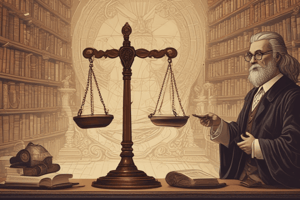Podcast
Questions and Answers
What is the primary difference between common law systems and civil law systems?
What is the primary difference between common law systems and civil law systems?
Common law systems rely on judicial precedent, while civil law systems are based on codified legal frameworks.
Explain the role of judicial precedent in common law systems.
Explain the role of judicial precedent in common law systems.
Judges in common law systems use previous rulings to guide their decisions.
What is the principle of stare decisis in the context of legal systems?
What is the principle of stare decisis in the context of legal systems?
Stare decisis means lower courts must follow the decisions of higher courts.
Which legal system allows judges to strike down legislative acts if they conflict with the constitution?
Which legal system allows judges to strike down legislative acts if they conflict with the constitution?
What is the basis for civil law systems originating from Continental Europe?
What is the basis for civil law systems originating from Continental Europe?
Describe the typical role of judges in civil law systems.
Describe the typical role of judges in civil law systems.
Who laid the groundwork for modern discussions of natural law with his writings on property rights?
Who laid the groundwork for modern discussions of natural law with his writings on property rights?
What are some early reflections on the nature of law from ancient Greece and Rome?
What are some early reflections on the nature of law from ancient Greece and Rome?
What is legal positivism and what does it maintain?
What is legal positivism and what does it maintain?
What key concerns does the philosophy of law seek to explore?
What key concerns does the philosophy of law seek to explore?
What are juridical acts and what do they involve?
What are juridical acts and what do they involve?
What is at the heart of jurisprudence in terms of legal reasoning?
What is at the heart of jurisprudence in terms of legal reasoning?
Flashcards are hidden until you start studying
Study Notes
Jurisprudence: Understanding the Philosophy and Theory of Law
Legal Systems
Jurisprudence, often referred to as the philosophy of law, revolves around understanding the nature of law and legal systems. Legal systems vary greatly across cultures and time periods, reflecting diverse interpretations of what constitutes fairness, justice, and correct behavior within a society. Two primary types of legal systems are worth discussing:
Common Law Systems
Common law systems, derived from the English legal tradition, emphasize the role of judicial precedent in decision making. These systems rely heavily on case law, with judges drawing on previous rulings to guide their decisions. Notable characteristics of common law systems include the use of juries in trials, the principle of stare decisis (the idea that lower courts must follow the decisions of higher courts), and the ability of judges to strike down legislative acts if they conflict with the constitution.
Civil Law Systems
In contrast, civil law systems, originating from Continental Europe, are based on codified legal frameworks. A country's entire legal system is encapsulated in a single or small collection of written codes, such as the Napoleonic Code in France. Additionally, these systems typically employ professional judges rather than juries, although trial procedures and advocacy roles may significantly vary.
Historical Development
The study of jurisprudence has evolved alongside the complexities of legal systems themselves. Early reflections on the nature of law emerged in ancient Greece and Rome, where philosophers like Plato and Aristaele sought to establish ethical guidelines for governing societies. However, it wasn't until the Enlightenment era that legal philosophy began to gain significant traction.
John Locke's writings on property rights laid the groundwork for modern discussions of natural law, while Immanuel Kant's emphasis on individual liberty and duty helped solidify the relationship between law and morality. Throughout the 19th and 20th centuries, legal scholarship continued to evolve with new perspectives emerging, including positivism, functionalism, and natural law theories.
Legal Reasoning
At the heart of jurisprudence lies the question of how to reason about legal issues. This involves determining the appropriate methods for interpreting and applying legal concepts to solve practical problems. Several approaches have been proposed, ranging from strict adherence to established rules to more flexible, pragmatic frameworks that incorporate societal values and norms.
Legal Positivism
One prominent approach is legal positivism, which maintains that law consists solely of the rules established by a legal system, regardless of whether these rules conform to broader moral or ethical principles. According to this perspective, l
Philosophy of Law
As a branch of philosophy, the philosophy of law seeks to explore the fundamental questions surrounding the nature and purpose of law. Key concerns include:
- What is the source of law's legitimacy? Is it derived from divine revelation, custom, or deliberate human design?
- How does law relate to morality? Should legal requirements align with moral duties, or are they distinct entities?
- What role does law play in shaping society and enforcing social order?
- What implications might philosophical theories about justice, freedom, and equality have for our understandings of law and legal institutions?
These questions are explored in various theoretical frameworks, including natural law theories, legal positivism, and legal pluralism, among others.
Juridical Acts
Finally, jurisprudence delves into the nature of juridical acts-actions that create, modify, or terminate legal relationships. These may involve contracts, agreements, judicial decrees, or other forms of legal commitment. By examining the properties and effects of juridical acts, scholars aim to deepen our understanding of law's function and impact in society.
Studying That Suits You
Use AI to generate personalized quizzes and flashcards to suit your learning preferences.




